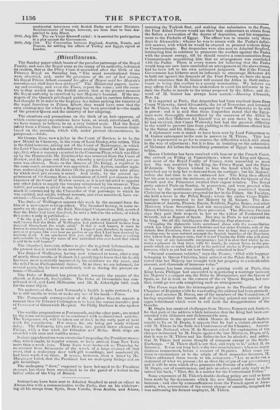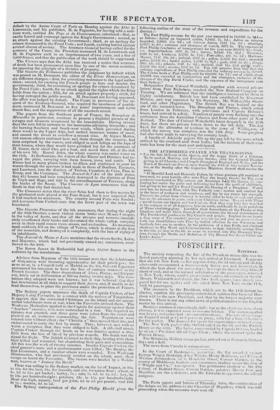Instructions have been sent to Admiral Stopford to send an
officer to Alexandria with a communication to the Pasha, Butt on his withdraw- ing all his troops from Syria, from Candle, from Arabia, and Adana,
restoring the Turkish fleet, and making due submission to the Porte, the Four Allied Powers would use their best endeavours to obtain from the Sultan a revocation of the decree of deposition, and his reappoint- ment to the Pashalie of Egypt. The officer was to remain only three days in Alexandria ; whence he was to return with the Pasha's defini- tive answer, with which he would be ordered to proceed without delay to Constantinople. But despatches were also sent to Admiral Stopford, instructing him to continue to prosecute the warfare against the Pasha -with the utmost energy, till be should receive a communication from Constantinople acquainting him that an arrangement was concluded with the Pasha. There is every reason for believing that the Pasha would long ere now have concluded an arrangement on the above terms,. had he been left to his own unbiassed judgment. But if the French Government has hitherto used its influence to encourage Mehemet Ali to hold out against the demands of the Four Powers, we have the most perfect assurance that M. Guizot will second the Allies in their endea. yours to bring this warfare to a speedy termination. We believe we may affirm that M. Guizot has undertaken to exert his influence to in- duce the Pasha to accede to the terms proposed by the Allies; and the word of M. Guizot has always been sacred.—Murning Chronicle, Nov. 24.
It is reported at Paris, that despatches had been received there from Count Walewsky, dated Alexandria, the 1st of November. anti intended for 31. Thiers, who was then supposed by Count Walewsky to be still in power : and it is said that those despatches stated that the Egyp- Bans were thoroughly demoralized by the successes of the Allies in Syria ; and that Mehemet Ali himself was so cast down by the news he had received, that Count Walewsky had had the greatest difficulty in the world to prevent him from yielding to the conditions offered him by the Sultan and his Allies.—Idem. A diplomatic note is stated to have been sent by I,ord Palmerston to N. Guizot subsequent to the note in answer to M. niers. This last note is represented to go far to remove the difficulties which still stood in the way of adjustment ; but it is firm in insisting on the submission • of Mehemet Ali before the hereditary possession of Egypt is conceded to hint.
Queen Christina has been received with honeur at the French Court. She arrived on Friday at Fontainbleau ; where tlle King and Queen, and most of the Royal Family of France, were assembled to meet her. She was received by the King, the Prime Royal, and the Duke D'Aumale, The Queen wished to kiss the hand which the King stretched out to help her to descend from the carriage ; but his Majesty, before she had time to do so, embraced her. The King then offered her his arm to mount the staircase, at the top of which the Queen of the French and the Princesses awaited their august relative. The Royal party entered Paris on Sunday, in procession, and were greeted with cheers by the multitudes assembled. The King conducted Queen Christina to the apartments prepared for her in the Palace. On Tuesday, she held a levee in the Palais Royal ; where the entire Corps Diplo- matique were presented to her Majesty by M. Guizot.- The Am- bassadors of Austria, Prussia, Russia, Sardinia, Naples, Rome, and other Ministers whose Sovereigns had not recognized the Government of Queen Christina, were among those presented. ThO Moniteur Parisien says they paid their respects to her as the widow of Ferdinand the Seventh, not as Regent of Spain. Her stay in Paris is not expected to be long. On all this intelligence the Morning Post observes- " Coupling the diplomatic visits mentioned above with the reconciliation which has taken place between Christina and her sister Carlotta, wife of the Infante Don Francisco, there is some reason now to hope that a good under- standing may be soon restored amongst the Spanish branches of the Bourbons. Our letters from Bourges state, that it is not Charles the Filth who will stand in the way of any honourable compromise; but it is clear that whilst he re- mains a prisoner in that town with his fluffily, he cannot listen to the pro- posals which are so much talked of in the political clicks in Paris—proposals, however, which as yet had not been formally submitted to him." • " Several enormous vehicles," says the France," filled with baggage belonging to Queen Christina, have arrived at the Petals Royal. It is stated that her Majesty has brought with her property to a considerable amount, and diamonds of immense value."
A rumour has been circulated, and is gaining credit at Paris, that King Louis Philippe had succeeded in negotiating a marriage between his Mejesty's youngest son, the Duke de Montpenster, and the Queen of Spain, so fur at least as the consent of the ex Queen Regent, her mo- ther, could go towards completing such an arrangement.
The Presse says that tho interruption given to the President of the Chamber of Deputies while he was reading the address had been premed- tated ; and accuses M. Dueos, one of the members of the Committee, of having organized the tumult, and of having pointed out certain pas- sages beforehand which were to call forth the disapprobation of the Concise.
M. Dupin has received challenges from Messrs. Ilemusat and Jaubert, foe that part of the address which intimates that the King had been sur- rounded with dishonest and dishonourable men.
In addition to the quarrel which Messrs. de Remusat and Jaubert sought to fix on M. Dupin, it appears that he had a violent altercation with M. niers in the Salle des Conferences of the Chamber. Accord- ing to the National, when M. de Remusat asked for explanation of the charges insinuated by M. Dupin against the late Ministers, Tenpin glide that it was to M. Tillers and his father-in-law he alluded ; and added, that 31. Tillers had never thought of conquest except at the Stock- Exchange. " M. niers shall know that, and reply to it," added M. de Remusat. It was not long beffire the two members met ,s when an angry dialogue commenced, before a number of Deputies. After some cu- rious recriminations as to the origin of their respective fortnnes, 31. Tillers addressed these words to his antagonist—" Let us make out a statement of what we possess ; let us show the origin of our possessiousl and it will be seen which of us possesses the fortune of a robber. . . • M. Dupin, out of countenance, and pale as ashes, could only reply as. he turned his back, " That, Sir, is a matter for the Correctional Police. '
Some exposures of M. Thiers's double-dealing policy are said to have been made by the documents which the new Ministers found in their bureaux ; and also by communications from the French agent at Alex- andria, who, unconscious of the recent change of' councils, imagined lie' was addressing his former employer, M. Titters. default by the Assize Court of Paris on Monday against the Abba de Lamennais, and his publisher, M. de Pagnerre, for having sold a sedi- tious work, entitled Du Pays et du Gouvemement, calculated-first, to excite hatred and contempt against the King's Government ; second, as an attack against the existing Government ; third, as an apology for crimes denounced in the Penal Code ; and fourth, exciting hatred against several classes of society. The Attorney-General having called for the sentence of the Court, the President sentenced M. de Lamennais and M. de Pagnerre each to an imprisonment of two years, and a fine of 5,000 francs, and that the publication of the work should be suppressed.
The Univers says that the Abba has received a notice that sentence of death has been pronounced upon him by one of the secret societies, for opposing the principle of a division of property. The Gazette des Tribunanz publishes the judgment by default which was passed on M. Desessart, the editor of the Ri!vue Denweratique, on six different charges,-first, tiff provoking resistance to the legal autho- rities; second, for exciting the French people to hate and despise the government; third, for containing an apology for crimes denounced by the Penal Code ; fourth, for an attack against the rights which the King holds from the nation ; fifth, for an attack against property ; sixth, for 'having outraged the public morals. M. Desessart not having appeared, the affair was judged by default. The Court, in pursuance of the re- quest of the Attorney-General, who required the maximum of punish- ment, sentenced M. Desessart to five years' imprisonment and 6,000 francs fine, and the suppression of all the numbers seized.
The papers from the Southern parts of France, the Semaphore de Marseilles in particular, continue to present a frightful picture of the ravages and disasters occasioned by the inundations. During several days the rain fell in torrents in the mountains adjoining Grenoble ; and the burning Southern and South-west winds, which prevailed during three weeks in the Upper Alps, had melted immense masses of snow, and caused the rivers to overflow a second time. At Aigues Mortes, 160 custom-officers stationed here and there through the country, had been surprised by the waters, and obliged to seek refuge on the tops of their houses, where they would have perished but for the exertions of M. Gonet, their chief who, got a boat, and saved them all, at the risk of his own life. Round Arles, the whole country was under water on the 15th. At Barbautane, the waters of the Rhone and Durance had ra- vaged the plain, carrying with them houses, trees, and cattle. The Rhone had in many places broken its dikes, and continued to pour its waters through the aperture it had made in those of Boulhon, Taraseon, and Lauriscet, into the districts of Trebon, Coustiers de Crau, Plan de Bourg, and the Camargue. The Journal de l'Ain of the 20th states, that 455 houses had been completely destroyed in the districts of Pont de Veyle and Bage, and 620 in the arrondissement of Treveux, along the banks of the Saone. The Courtier de Lyon announces that the floods in that city had diminished.
The Commerce states that the river Seine had risen to five metres by the graduated scale placed at the Pont Royal, but it was expected that it had reached its maximum. The country around Paris was flooded ; and accounts from Corbeil state that the lower part of the town was inundated.
The Caulk Pienzontese of the 9th announces, that during the night of the 30th October, a most violent storm broke over Mount Carogne, in the valley of Aoste, and that all the streams and torrents immedi- ately overflowed their banks and devastated the whole valley, carrying away in their rapid course trees, stones, and avalanches. An enormous mass suddenly fell on the village of Verres, which is situate at the foot of the mountain, and destroyed it completely, with the loss of eighty of its inhabitants.
The Journal de Maine et Loire mentions that the rivers Sarthe, Loire, and Mayenne, which had not previously caused any uneasiness, over- flowed on the 20th.
The Baron James de Rothschild had given 10,000 francs to the sufferers by the inundations.



























 Previous page
Previous page